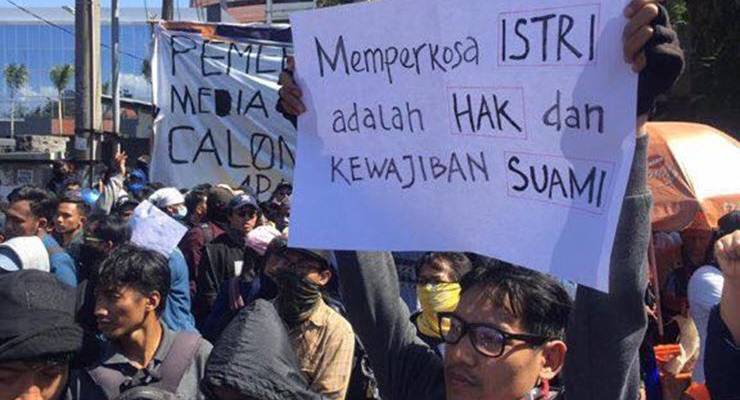
When Indonesian President Joko Widodo was re-elected by a comfortable majority in May, it seemed that he would have several years to step up his program of economic reforms.
Now, weeks out from his October 20 inauguration, the country’s House of Representatives (DPR), also elected in May, has been sworn in amid ongoing street protests by a rejuvenated student cohort. The protests are the biggest seen in the country since those that helped bring down the Suharto regime in 1998.
Two students and another young person were killed in protests at the weekend in the northern province of Sulawesi. The demonstrations are taking their cues from those that have been roiling Hong Kong for more than four months, and highlight fears over Widodo’s commitment to reform.
The marches initially started over a proposed suite of new laws and amendments, including a ban on extramarital sex that could effectively criminalise homosexuality, a ban on abortion except in cases of rape and incest, stronger laws on blasphemy, and laws making it a crime to insult the president and vice-president.
Reformist protesters have demanded the inverse, including laws banning marital rape and prison terms for parents who marry-off underage progeny. They’ve also voiced their concerns over environmental issues, including pro-business mining laws and the ever-present problem of palm oil corporations burning and cutting down virgin rainforest for farmland. Workers’ groups joined the protests in Jakarta on October 2, agitating for better labor conditions.
Then there’s the issue of corruption. Protesters have called for a ban on military and police officers serving in government, and demanded the president revoke a law that restricts the investigative powers of the Corruption Eradication Commission (KPK). Set up in 2002, the KPK has been instrumental in helping Indonesia on the path to democracy post-Suharto. Widodo has been concerned that Islamic purists are “Talibanising” the organisation, although observers say there is little evidence of this. On September 26 he bowed to pressure and said he was considering a regulation that would bypass the new law.
The Australian government reacted quickly to last week’s protests, spooked no doubt by the thought of countless Australian holiday-makers caught up by the new sex laws. But it’s the broader notion of an increasingly conservative Indonesia, and the radical side of Islam that rides along in the shadows, that has never boded well for Australia — either in terms of the micro level of tourism or the macro level of getting along with a neighbour that we will find increasingly difficult to understand.
Similarly, any moves to wind back anti-corruption efforts with further cruel what is already a difficult environment for foreign businesses to navigate, perhaps negating any positive flow-on effects from the recent Indonesia-Australia free trade agreement.
Still, keen observers believe Widodo’s greatest problems lie not with anti-conservative, anti-corruption students, but with the opposition led by the Gerindra Party, which has the third largest number of seats in the DPR, and his own somewhat unwieldly six-party coalition that gives him a nominally comfortable majority.
Since the peak of the protests on September 24 and Widodo’s (yet unfulfilled) promise of action, things have certainly calmed down in terms of the number of people taking to the streets. As well, the make-up of students, or those that may be pretending to be students, has changed. A split has emerged in the student cohort, with conservative students speaking out in favour of the new laws (unsurprising given the strength of Islamist campus groups). Likewise, people on the ground say that other elements — and Indonesia has myriad protest groups — appear to be infiltrating the protests which are atomising as a result.
Whatever the case, the government must remain careful. Students are an important and somewhat hallowed constituency in Indonesia, due to their pivotal role in bringing down Suharto. The longer the protests go on, assuming they continue to fracture, it may be easier for the government to divide and conquer.
Ultimately, this is a reality check for Widodo, who must weigh political expediency with his legacy. Whether he has the political strength to choose his own path remains unclear.








Finally some coverage of this.
I hope the protests don’t fizzle out.
I think these laws are the inevitable result of the 2017 mega visit and associated $25b “investments” by the Saudis.
Another part of the current problems are the Joko sell out to neoliberalism programmes he’s trying to implement. Good article by Andre Vltchek last week (24/09) on those selling-off plans in journal-neo.org . The protests could be the beginning of real fireworks in Indonesia.
“The Northern province of Sulawesi.” What does that mean? Sulawesi is northern but it’s a huge island containing a number of provinces. Does Sainsbury mean the province of Northern Sulawesi? Is it too much to expect someone who writes regularly about eastern Asia to be able to place an incident he writes about in the right province which may be anywhere within a thousand kilometres or more from what he has written there? I’m not nitpicking, I have friends in two Sulawesi provinces so the report is unhelpful to me and different parts of Sulawesi are culturally and linguistically so different, being far apart, that just saying Sulawesi means less than just saying Australia when you could specify Queensland, WA or Tasmania. And yes, the media in other countries make the same mistake. I’ve had Indonesian friends ask if I’m all right when there’s been flooding or some other disaster in a state on the other side of the country.